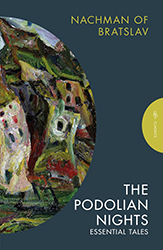A Plague of Cholera and Other Stories is the second story collection by Yiddish writer Jonah Rosenfeld to be translated by Rachel Mines into English. Born in Chartorysk, Volhynia, Russia, Rosenfeld was a prominent literary figure in the early twentieth century. Although he was published in The Forward for fifteen years, his work has become relatively obscure. With this book, Mines shows that his waning cultural impact has been much more a loss than a blessing.
One of the most striking aspects of the collection is its psychological depth, which was unusual for its time. As Mines notes in her introduction, Rosenfeld’s stories often revolve around a character’s subconscious desires and their difficulty to both identify those desires and act on them in a way that suits their best interest. On multiple occasions, characters note to themselves (to paraphrase), “I can’t say why I feel so sad, but I know I have to [X],” before setting themselves on a path to self-destruction. Rosenfeld digs deeply into a space of uncertainty and self-loathing, giving a roundedness to his characters that wasn’t always present in the works of his contemporaries. This digging, though, does take up significant space in some of the stories, which can make the reading experience a bit slower.
Because the characters suffer for reasons beyond their understanding, the stories take on a dark and, at times, bleak tone — Mines calls them “psychological horror stories.” They revolve around lonely people, many of whom live in abject poverty, and who do not see a way out for themselves. A young woman has no “good” marital prospects; a man is seemingly incapable of expressing his feelings for a woman he loves without first alienating her; and a whole town uses spiritual and mystical remedies to ward off a plague of cholera. All of these characters have a grim view of life, and only on occasion does Rosenfeld offer them some solace. Yet Rosenfeld was clearly an empathic writer — he never mocks or makes anything less of his characters’ suffering, despite their occasional less-than-charitable behavior. And although his characters tend to be afflicted with the same malady, he’s able to depict a wide array of circumstances, shining a light on Jewish life in Central Europe in the late nineteenth and early twentieth centuries.
Mines’s work as a translator deserves attention and praise as well. Her translation of the Yiddish reads as fluid and modern. Her introduction gives helpful context to Rosenfeld’s life, as well as his approach to writing and recurring themes. Having these accompanying insights makes it easier to understand and appreciate Rosenfeld’s talent and relevance.
Rosenfeld was a mainstay of Yiddish literature during his time, and A Plague of Cholera and Other Stories reminds us why that was: his stories are sharp, resonant, and psychologically rich. It’s a mitzvah that Mines continues to reintroduce Rosenfeld’s work to the world.
Benjamin Selesnick is a psychotherapist in New Jersey. His writing has appeared in Barely South Review, Lunch Ticket, Tel Aviv Review of Books, and other publications. He holds an MFA in fiction from Rutgers University-Newark.





